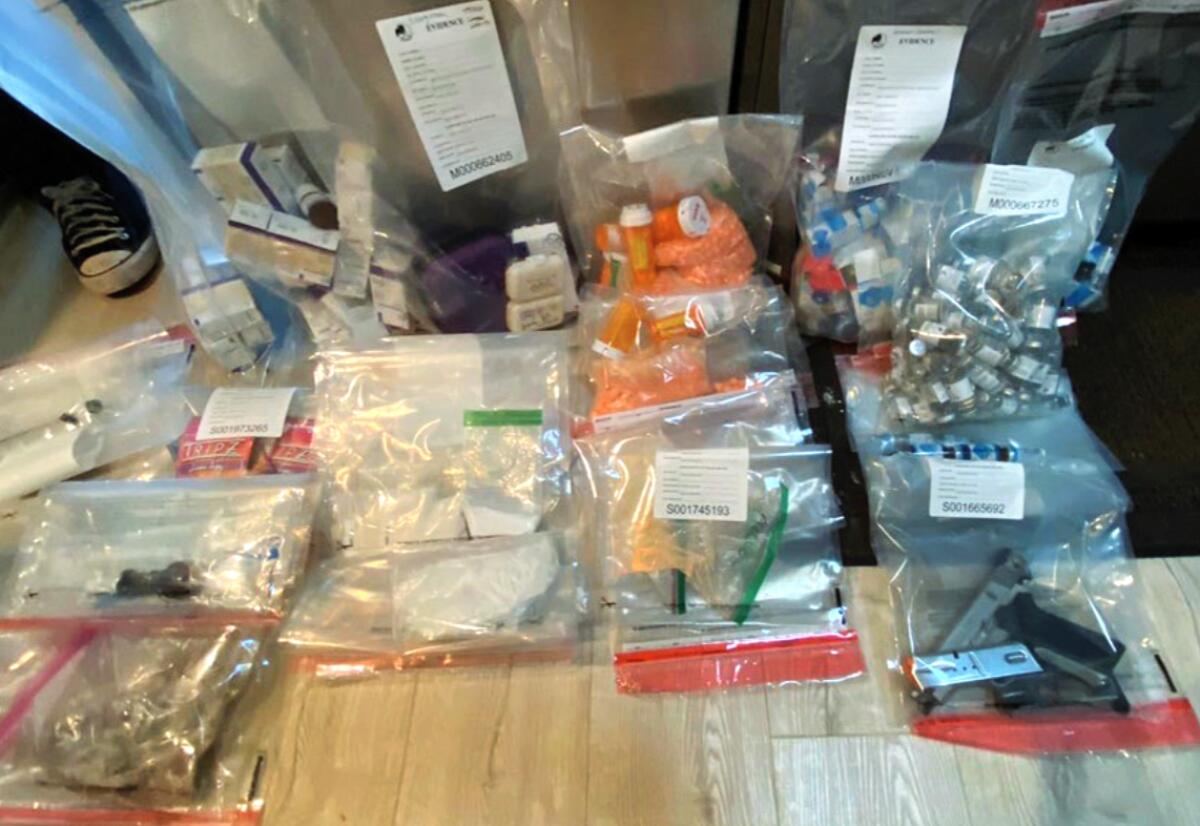A dealer known as ‘Ketamine Queen’ and 2 doctors among 5 charged in death of Matthew Perry

- Share via
Matthew Perry’s live-in personal assistant, two doctors, an alleged drug dealer known as the “Ketamine Queen” and another man have been charged with providing ketamine that led to the death of the “Friends” star last year, authorities said Thursday.
Federal prosecutors allege that Perry’s personal assistant, Kenneth Iwamasa, worked with the two doctors — Mark Chavez and Salvador Plasencia — and drug dealers Jasveen Sangha and Erik Fleming to obtain thousands of dollars’ worth of ketamine for the actor, who had long struggled with addiction.
U.S. Atty. Martin Estrada said at a news conference that the defendants “took advantage of Mr. Perry’s addiction to enrich themselves.”
“These defendants were more interested in profiting off Mr. Perry than caring about his well-being,” Estrada said.
Sangha, the so-called Ketamine Queen, and Plasencia, known as “Dr. P,” are facing charges that include conspiracy to distribute ketamine, distribution of the drug resulting in death, possession with intent to distribute, and altering and falsifying records related to a federal investigation, according to the indictment.
The actor, who rose to superstardom playing the sarcastic but lovable character Chandler Bing on the sitcom “Friends” in the 1990s, was found dead in the hot tub of his swimming pool at his Pacific Palisades home on Oct. 28. Trace amounts of ketamine were found in his stomach, according to the Los Angeles County medical examiner.
In recent years, ketamine prescriptions have increased along with a black market business for those self-medicating or using the drug recreationally.
Perry had sought treatment for depression and anxiety and went to a local clinic, where he became addicted to intravenous ketamine, according to Drug Enforcement Administration Administrator Anne Milgram. When clinic doctors refused to increase his dosage, he turned to outside sources, Milgram said.
Perry’s autopsy revealed the level of ketamine found in his blood was about the same as would be used during general anesthesia.
“Matthew Perry’s journey began with unscrupulous doctors who abused their position of trust because they saw him as a payday, to street dealers who gave him ketamine in unmarked vials,” Milgram said.
A month before Perry’s death, Plasencia learned that the actor was interested in obtaining ketamine, a legal medication commonly used as an anesthetic. It can be abused recreationally, with users drawn to it for its dissociative effects.
After learning of Perry’s interest, Plasencia contacted Chavez, who previously operated a ketamine clinic, to obtain the drug to sell to the actor, authorities said. In text messages to Chavez, Plasencia discussed how much to charge Perry for the ketamine, stating, “I wonder how much this moron will pay” and “Lets find out,” according to court records.
The doctors distributed 20 vials of ketamine to Perry for $55,000 in cash, charging him $2,000 for a vial that cost Chavez $12, authorities said.
Court records show that in mid-October, Perry’s personal assistant, Iwamasa, also began obtaining ketamine for Perry from Sangha and Fleming, who provided the drugs at a lower cost. Sangha sold about 50 vials of the drug to the actor for $11,000, authorities said.
Federal prosecutors allege Plasencia taught Iwamasa how to inject Perry with ketamine, sold the assistant the drug and left vials of it for Iwamasa to inject into the actor. At one point, a large dose caused Perry to “freeze up,” prosecutors said. The doctor is also accused of injecting Perry with the drug inside a car in a Long Beach parking lot.
In the indictment, Plasencia, 42, was accused of giving officials falsified documents showing a medical treatment plan for Perry that claimed he was being given a maximum dose of 60 milligrams over 24 hours. In fact, prosecutors say, Perry was injecting far higher doses.
Authorities found Perry unresponsive in his Los Angeles home Saturday. There was no sign of foul play.
Chavez, 54, has agreed to plead guilty to a count of conspiracy to distribute ketamine, authorities said.
Fleming, 54, who authorities say distributed the ketamine that killed Perry, pleaded guilty this month to a count of conspiracy to distribute ketamine and a count of distribution of ketamine resulting in death.
Iwamasa, 59, pleaded guilty this month to a count of conspiracy to distribute ketamine causing death. He also admitted to injecting Perry with ketamine without medical training, including performing several injections on the actor the day he died, authorities said.
Iwamasa faces up to 15 years in prison and Fleming 25 years. Chavez will face up to 10 years in prison. If convicted, Sangha could face up to life in prison, and Plasencia could serve up to 120 years.

How did ‘Friends’ actor Matthew Perry get the ketamine that officials cited as the cause of his death last year?
Perry’s death triggered a months-long inquiry that led investigators into what Estrada called a “broad underground criminal network responsible for distributing large quantities of ketamine” to the actor and others.
Authorities executed a search warrant on March 19 at Sangha’s residence in North Hollywood, known as the “Sangha Stash House,” where they discovered what amounted to a “drug-selling emporium,” Estrada said.
Inside the home, authorities said they found 79 vials of ketamine, just over 3 pounds of orange pills containing methamphetamine, psilocybin mushrooms, cocaine and prescription drugs that appeared to be obtained fraudulently. Investigators also found a green journal with handwritten notes that detailed thousands of dollars in drug transactions, according to federal prosecutors.
Prosecutors allege Sangha, 41, was aware of the fatal risks associated with ketamine. In August 2019, she sold the drug to another man, Cody McLaury, before he overdosed, authorities said. One of McLaury’s family members later sent her a text saying the ketamine had resulted in his death.
The Los Angeles Police Department and Drug Enforcement Administration are investigating how the actor came to have so much of the drug.
Four days before Perry’s death, Fleming purchased 25 vials of ketamine from Sangha and delivered them to the actor’s personal assistant, prosecutors said. Iwamasa injected Perry with more than 20 shots of ketamine in the days that followed.
The drug in Perry’s system caused cardiovascular overstimulation and respiratory depression. Other contributing factors in his death included drowning, coronary artery disease and the effects of buprenorphine, a medication used to treat opioid-use disorder, the medical examiner reported.
The autopsy report said Perry had no other drugs in his system and had been 19 months sober at the time of his death. There was no evidence of illicit drugs or paraphernalia at his home.
The medical examiner also noted that Perry, 54, had diabetes and suffered from chronic obstructive pulmonary disease, which refers to a group of diseases that cause airflow blockage and breathing-related problems. He at one time had a two-pack-a-day cigarette habit.
A coroner’s investigator interviewed a person close to Perry who described him as in “good spirits” and said he had quit smoking two weeks before his death and was weaning himself off ketamine. What investigators didn’t know at the time was that Perry’s ketamine addiction was apparently spiraling out of control, federal prosecutors said.
In recent years, ketamine prescriptions have increased along with a black market business for those self-medicating or using the drug recreationally.
Perry’s long history of drug and alcohol abuse was detailed in his memoir, “Friends, Lovers, and the Big Terrible Thing,” and he frequently said he hoped to be remembered for helping others overcome addiction.
“The kind of message that I guess I give out with this book is don’t give up,” Perry said in a 2022 interview. “There’s help out there.”
Times staff writer Libor Jany contributed to this report.
More to Read
Sign up for Essential California
The most important California stories and recommendations in your inbox every morning.
You may occasionally receive promotional content from the Los Angeles Times.





















